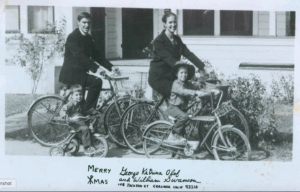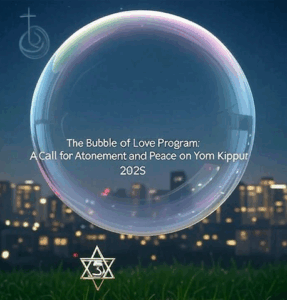A Call for Atonement and Peace on Yom Kippur 2025
On August 26, 2025, Katrina’s Dream celebrates 20 years of advocating for peace, justice, and equality—a vision born in the wake of Hurricane Katrina as my family and I gathered to honor my late mother-in-law, Katrina. From that moment of loss and hope, Katrina’s Dream emerged as a global movement, amplified by our Power of One ERA Program and now, our newest initiative: the Bubble of Love Program, launching on Yom Kippur 2025. Rooted in the concept first inspired by my late spiritual director, Rev. Kathryn Piccard, in 2014, this program invites people of all faiths to wrap the world in a “Bubble of Love”—a sacred act of atonement, reconciliation, and positive energy drawn from their own spiritual traditions.
 This legacy of resilience echoes the Swanson family’s own history of navigating conflict with care and courage. During their parish exchange program in Botswana, Katrina was deeply moved by the courage and faith of women leaders in the community, which sparked her own call to serve and advocate for justice. In 1967, the Swanson family had just finished a parish exchange program in Botswana and were headed to Coalinga, CA, with a stopover in the Holy Land. However, their visit was disrupted when the Six-Day War broke out. Forced to flee amid the chaos, they had to adapt their carefully curated plans for a life of service and advocacy to the harsh realities of sudden displacement, making their way back to the US Embassy. hey left behind cherished experiences and communities, yet carried forward an unyielding commitment to peace and justice—qualities that continue to infuse Katrina’s Dream today.
This legacy of resilience echoes the Swanson family’s own history of navigating conflict with care and courage. During their parish exchange program in Botswana, Katrina was deeply moved by the courage and faith of women leaders in the community, which sparked her own call to serve and advocate for justice. In 1967, the Swanson family had just finished a parish exchange program in Botswana and were headed to Coalinga, CA, with a stopover in the Holy Land. However, their visit was disrupted when the Six-Day War broke out. Forced to flee amid the chaos, they had to adapt their carefully curated plans for a life of service and advocacy to the harsh realities of sudden displacement, making their way back to the US Embassy. hey left behind cherished experiences and communities, yet carried forward an unyielding commitment to peace and justice—qualities that continue to infuse Katrina’s Dream today.
The Origin of the Bubble of Love
In 2014, during my pilgrimage across the USA for the Equal Rights Amendment (ERA), Rev. Kathryn Piccard introduced me to the “Bubble of Love” concept—a way to surround challenges with God’s pure, loving energy. As I wrote in our 20th-anniversary blog, this idea took root within my “Power of 10” network, a group of cherished friends and advocates—Mad Max, Lady Jane, Crisopedia, Uncle Nasty, Sergeant Sweetheart, Bishop Trevor, Dude, and Dr. K—who embody this principle through prayer and support for Katrina’s Dream. Together, we’ve used the Bubble of Love to uplift each other, praying for healing, strength, and justice, as seen in our prayers for John Kratsios and Lady Jane’s recovery.
This concept has grown from a personal prayer practice into a global call to action. The Bubble of Love Program harnesses this vision to foster atonement and peace, inspired by the sacred moment of Yom Kippur 2025, Judaism’s holiest day of repentance and forgiveness.
The Bubble of Love Program: Yom Kippur 2025
 The Bubble of Love Program invites individuals and faith communities worldwide to join us on Yom Kippur (October 1–2, 2025) in a transformative act of atonement and reconciliation. Drawing on the spirit of teshuvah (repentance), we encourage people of all faith perspectives—Christian, Jewish, Muslim, Hindu, Buddhist, Indigenous, and beyond—to reflect on their own spiritual traditions and envelop the world in love, healing, and unity. This initiative aligns with Katrina’s Dream’s mission to bridge divides through interfaith dialogue, as seen in our advocacy for the ERA and workers’ rights alongside the White House Faith Office and leaders like Senator Lisa Murkowski.
The Bubble of Love Program invites individuals and faith communities worldwide to join us on Yom Kippur (October 1–2, 2025) in a transformative act of atonement and reconciliation. Drawing on the spirit of teshuvah (repentance), we encourage people of all faith perspectives—Christian, Jewish, Muslim, Hindu, Buddhist, Indigenous, and beyond—to reflect on their own spiritual traditions and envelop the world in love, healing, and unity. This initiative aligns with Katrina’s Dream’s mission to bridge divides through interfaith dialogue, as seen in our advocacy for the ERA and workers’ rights alongside the White House Faith Office and leaders like Senator Lisa Murkowski.
In a recent conversation with our Middle East Consultant Mahmood Al’Balushi, a man of deep religious conviction who resides in Doha, Qatar, I sought his reflection on the Bubble of Love Program: Yom Kippur 2025. Upon reflecting, he responded, “And not equal are the good deed and the evil deed. Repel [evil] by that [deed] which is better; and thereupon the one whom between you and him is enmity [will become] as though he was a devoted friend” (Surah Fussilat, 41:34). His insight offers key interpretations and guidance: The verse emphasizes the inherent difference between good and evil, calling believers to respond to evil with a “superior” or “better” form of goodness. This profound action can transform an enemy into a close, intimate friend, testament to the power of superior kindness and empathy. Such a response requires patience, forbearance, and forgiveness, even amidst anger or injustice. Practically, this means pausing before reacting to negativity and choosing instead to respond with kindness, understanding, and a positive gesture, even when difficult.
How to Participate
-
Reflect and Pray: Starting on Rosh Hoshanah with the focus on the atonement through Yom Kippur 2025, take a moment to pray or meditate, wrapping your personal joys, struggles, and global concerns—such as the Israeli-Palestinian conflict or workplace justice—in a “Bubble of Love.” Draw from your faith’s teachings on forgiveness, whether it’s the Christian call to love thy neighbor, the Islamic emphasis on rahma (mercy), or the Buddhist practice of metta (loving-kindness). Then continue every day forward holding the concerns and struggles in that bubble as we move forward healing the world.
-
Engage in Dialogue: Host or join interfaith gatherings—virtual or in-person—to share stories of atonement and hope. Inspired by our vision for Israel and Palestine to find peace through mutual apologies and humanitarian aid, encourage conversations that foster empathy across divides.
-
Act for Justice: Support Katrina’s Dream’s advocacy by calling Congress (202-224-3121) to co-sponsor S.J. Res. 38/H.J. Res. 25 for the ERA ,and the Warehouse Workers Protection Act and the Faster Labor Contract Act. Contact the White House Faith Office at (202) 456-1414 or whitehouse.gov/contact, addressing Paula White-Cain, to align their efforts with our call for equality and worker protections and the end of war in the pursuit of peace.
-
Spread the Love: Share the Bubble of Love Program on social media with #BubbleOfLove and #YomKippur2025. Invite your network to join, echoing the Power of One’s call for one conversation, one action, one change.
Why It Matters
The Bubble of Love Program is a response to a world fractured by conflict, from the Middle East to workplace struggles at places like Amazon. By invoking your own faith perspective, you contribute to a collective energy of healing. Yom Kippur’s call to seek forgiveness from those we’ve wronged before God resonates universally—whether through the Vidui prayer, the Lord’s Prayer, or other sacred practices. As we wrote in our Yom Kippur 2025 article, this moment can be a turning point for reconciliation, proving that vulnerability is strength.
In this spirit, we are grateful for the reflection from Bishop Mwamba Mwamba of Zambia: “May we all be peacemakers,” citing Matthew 5:9—”Blessed are the peacemakers, for they will be called children of God.” His words remind us that true atonement calls us to active peacebuilding, uniting our diverse faiths in a shared pursuit of harmony and justice.

